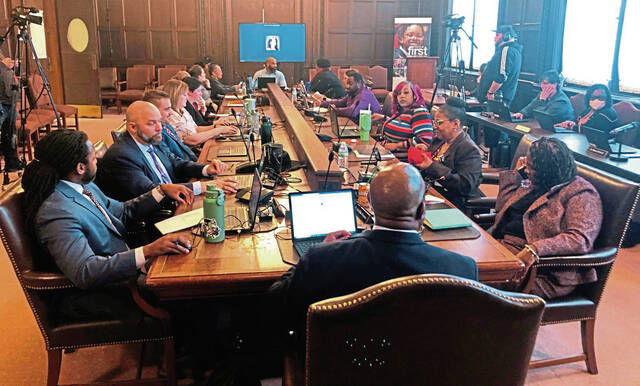After weeks of warning about its financial peril, the Pittsburgh region’s largest school district on Tuesday sued Allegheny County and its executive, Sara Innamorato, to try to force a countywide property reassessment.
Pittsburgh Public Schools solicitor Ira Weiss said the urban school district is facing a dire financial crisis caused by plummeting property values. He warned the district will have to dole out tens of millions of dollars in refunds as property values plunge in the city, particularly among skyscrapers and large commercial properties in Downtown Pittsburgh.
“We have provided the county executive with a reasonable time to consider our request to order the reassessment. She has replied with the same general statements about more ‘review and study.’ The time has passed for that,” Weiss said in a statement.
Last month, the district’s board voted unanimously to authorize the lawsuit, which was filed in Allegheny County Common Pleas Court and named Innamorato in her official capacity.
Weiss said then he would give the county time to voluntarily trigger a reassessment before filing suit. The lawsuit seeks to have the court retain jurisdiction on the matter throughout a reassessment process and to set a realistic timetable for its implementation.
Innamorato’s spokeswoman, Abigail Gardner, said the administration has no comment on the specifics of the lawsuit.
But Gardner said the county is gathering data to analyze the implications of a countywide reassessment.
She added any reassessment must be revenue neutral and “not a backdoor tax hike for the people of Allegheny County and should protect seniors and low-income homeowners in the process.”
Innamorato, who took office at the start of this year, initially campaigned on supporting a countywide reassessment, saying it would create equity in the property tax system.
She softened her stance throughout her campaign, modifying it to say she would back a reassessment if the community supported it.
This month, she backed an effort to make county reassessments a statewide issue and have them triggered regularly by the Legislature.
Gardner reiterated Innamorato’s preference that reassessments be shifted away from the control of individual counties and become state-mandated.
She said this would make reassessments more “mundane, regular occurrences” and not upend the system once a decade. Gardner said the system should be more predictable.
Innamorato has not said if she will voluntarily launch a reassessment.
Allegheny County Council President Pat Catena, D-Carnegie, favors a countywide reassessment but said he is disappointed Pittsburgh Public Schools is choosing litigation instead of working with the county.
“I’m very concerned that rushing into something without proper planning will cause another unmitigated disaster similar to past reassessments,” Catena said.
Weiss said the school district did not come to this decision lightly, and it can’t be subject to the whims of the Legislature or any possible wholesale fix that is not guaranteed to happen.
“Desperate times call for serious measures,” he said.
The school district is losing millions of dollars in revenue because of the county’s declining common level ratio, a formula used to calculate real estate values for tax purposes.
In 2021, Allegheny County was using a common level ratio of 81.1% — meaning a property seeing an appeal would have its assessment changed to about 81% of its fair market value. A house reassessed at $100,000, for instance, would pay taxes on only $81,100.
After a successful lawsuit brought by homeowners, a judge ordered the reduction of the common level ratio to 63.5% in 2022 and then down to 54.5% in 2023, meaning owners of the same $100,000 house in the previous example would pay taxes on only $54,500 of its value.
A countywide reassessment has not occurred since 2012, when it was triggered by a lawsuit.
Weiss said the refusal of Innamorato’s predecessor, Rich Fitzgerald, to trigger a reassessment has created a “broken” system.
He said lower-valued properties are overassessed, and higher-valued properties are underassessed. And he alleged this violates the Pennsylvania Constitution’s uniformity clause, which says taxes must be applied uniformly on similar types of property in the same taxing jurisdiction.
“This means those at the lower end of the spectrum pay more taxes than they should, and those at the higher end pay less than they should,” Weiss said. “That is simply illegal and unfair.”
County lawmakers in Pennsylvania have the ability to trigger reassessments, but they rarely do. Reassessments usually are triggered by lawsuits, albeit sporadically.
Beaver County recently completed a countywide reassessment forced by a lawsuit. Westmoreland County hasn’t reassessed since 1972. And Butler County hasn’t had a reassessment since 1969.
Edward Hirshberg, a lawyer at Ryan Law firm in Downtown Pittsburgh, represents commercial clients across the Pittsburgh region and the state.
He said Pittsburgh Public Schools’ lawsuit has real teeth.
“The school district almost certainly has standing to bring this suit,” he said. “The disparate treatment of two types of property owners is simply unconstitutional.”
Hirshberg said Allegheny County’s situation resembles disparities that triggered court-ordered reassessments recently in Beaver and other counties.








